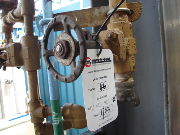 Rotary vane compressor manufacturer, Mattei, has claimed that the new international standard ISO 11011, Compressed air – Energy efficiency – Assessment, will help compressed air users to save energy, while also standardising the energy audits offered by compressed air companies.
Rotary vane compressor manufacturer, Mattei, has claimed that the new international standard ISO 11011, Compressed air – Energy efficiency – Assessment, will help compressed air users to save energy, while also standardising the energy audits offered by compressed air companies.
ISO 11011 is currently in development, with a view to being introduced in 2013, and will contain a framework for the assessment and auditing of compressed air systems.
With compressed air being the UK’s fourth utility, electrically driven compressors are a major user of energy – in the industrial sector they account for around 10% of electricity costs. Unfortunately, compressed air systems don’t always run to their best potential, with unsuitable compressors, leaks, poorly sized pipework, long distances, excessive bends and fittings, and improper use all affecting efficiency levels.
The main purpose of the forthcoming ISO 110011 standard is to encourage end users to assess their compressed air systems – via companies that carry out energy audits in line with ISO 11011 guidelines – and to subsequently take the recommended actions to reduce their energy use.
According to BCAS (British Compressed Air Society) the new standard will set requirements for conducting a compressed air system assessment, analysing assessment data plus reporting and documentation of assessment findings, and identifies the roles and responsibilities of those involved in the assessment.
Andy Jones, general manager at Mattei, said, “For some time responsible manufacturers and compressed air equipment suppliers will have been advising compressed air users to invest in energy audits, data logging exercises and leak detection surveys, especially before a new compressor is installed.
“However, an end user is under no obligation to carry out such assessments, and so it’s likely that the vast majority of businesses don’t know how much compressed air they use, or how much it costs them – or even if their compressors are actually appropriate for their production processes.
“Though voluntary, we hope that compressed air users will see the value of ISO 11011. Importantly, the standard will help them to establish how much compressed air they use, and how much it costs them to generate it. It should deliver sustainable results – ultimately saving energy and reducing carbon emissions, and could also be of benefit when a business is trying to demonstrate its environmental credentials to potential customers.”
Mattei believes the other major benefit of ISO 11011 is that end users can expect like for like energy audits. Currently, many compressed air companies provide energy audits as part of their service offering, but they tend to vary from one supplier to the next.
With a lack of industry standards and guidelines, individual companies decide how they measure compressor energy consumption and what recommendations they make. From 2013 companies will be able to adopt the principals set out in ISO 11011, and Mattei hopes there will be detailed methodology and guidelines to follow.
Jones continued, “Mattei wholly welcomes the forthcoming ISO 11011 standard – it’s vital for industry to understand how much energy is used producing compressed air, and how this can be improved. It’s also essential for energy audits to be regularised, so we’ll all be offering similar advice and carrying out the same assessment/auditing procedures on a level playing field – which can only be of benefit to the end user.”


